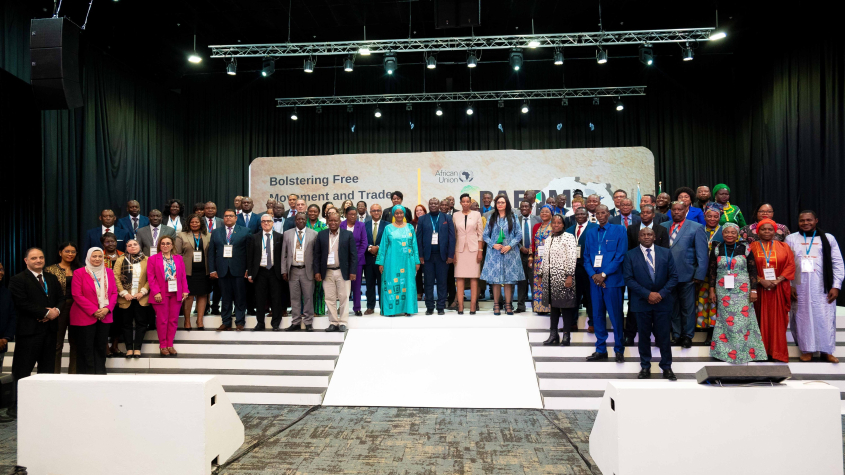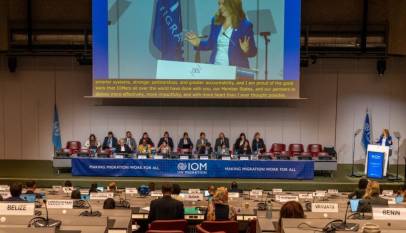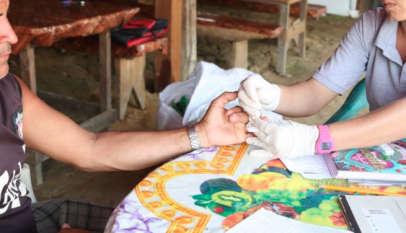PAFOM-8: Bolstering Free Movement – Free Trade Nexus in AfCFTA
The 8th Pan African Forum on Migration (PAFoM-8) proffered crucial recommendations, which, if implemented, will help Africa harness the benefits of the nexus between trade and the free movement of people, especially labor migration.
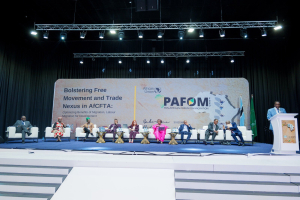
Free movement of people, capital, goods and services is at the heart of Africa’s integration agenda. To this end, Aspiration 2 of the African Union Agenda 2063 seeks to accelerate progress towards continental unity and integration for sustained growth, trade, exchange of goods, services, free movement of people and capital.
It was this vision that inspired the creation of the African Continental Free Trade Agreement (AfCFTA), alongside the Migration Policy Framework for Africa (MPFA) and the Protocol to the Treaty Establishing the African Economic Community Relating to Free Movement of Persons, Right of Residence and Right of Establishment i.e., AU Free Movement Protocol [FMP].
This underscores the complementarity between the FMP and AfCFTA as well as the free movement-free trade nexus. Simply put, there is no free movement of goods, services and capital without the free movement of people. The duo of unhindered human mobility and free movement of capital, goods, and services are the boundless enablers of wealth and prosperity creation as well as socioeconomic development.
In the same vein, labor mobility is necessary for enhanced productivity and industrialization, whereas irregular human mobility only creates challenges for countries of origin, transit, and destination, limiting migrants’ contribution to socio-economic development in both countries of origin and destination. It was in a bid to guarantee effective labor migration governance in Africa that the Joint Labor Migration Program (JLMP) for Africa was adopted by AU Heads of State and Government in 2015.
Despite recent efforts to improve intra-African trade, limited attention has been paid to the multiple barriers to human mobility which directly affect the movement of goods and services. Such barriers include security concerns, immigration controls, entry and stay requirements and visa requirements etc. Yet, perhaps more than any other barrier to the implementation of the FMP is AU countries’ lack of an integrated boarder management and poor legal identity management systems.
The fact that most Member States lack the capacity and resources to establish and maintain adequate civil registries for validation of the identity of their nationals and to implement integrated border management systems explains their reluctance to ratify free movement instruments, citing potential security breaches in aspects of public policies related to social development, health and security.
It was against this backdrop that the 8th Pan African Forum on Migration (PAFoM-8), held in Gaborone, Botswana recently. Themed “Bolstering Free Movement and Trade Nexus in AfCFTA: Optimizing Benefits of Migration, Human Mobility and Development”, the Forum was hosted by the AU in collaboration with the Government of Botswana, the International Organization for Migration (IOM) as well as the Deutsche Gesellschaft für Internationale Zusammenarbeit (GIZ), which implements its activities on behalf of the German Federal Ministry of Economic Development (BMZ).
The FMP, the updated Migration Policy Framework for Africa (MPFA) and its Plan of Action (2018–2030) are the cornerstones of the AU’s migration policy. While the FMP supports the free movement of people, as well as their rights to residence and establishment across the continent, the MPFA provides AU member states and Regional Economic Communities (RECs) with detailed policy guidelines to aid the creation and implementation of national and regional migration policies.
“Without people, goods, services wouldn’t cross borders” – Botswana’s labor minister
In her keynote at the opening of PAFOM-8, Hon Anna Maria Mokgethi, Botswana’s Minister of Labor and Home Affairs, called on African leaders to invest in creating awareness of the vast opportunities which can be brought by safe and orderly migration, in terms of unleashing sustainable economic growth.
“We, however, cannot talk about sustainable development without talking about migration and trade. In simple terms, migration influences economic development through facilitation of trade, to the extent that without people, goods and services would not be able to cross borders and contribute to formal economic growth. Free movement of goods and people (including labor) and capital is a powerful facilitator for sustainable development,” the Minister noted.
While speaking on Botswana’s efforts to foster free and safe movement of people, goods and services in the Southern African Development Community (SADC) region, the minister said they had jointly with Zambia established the Kazungula One Stop Border Post (OSBP), which offers a unified processing of both people and goods by the two countries, just as they had adopted the use of border passes for movement of people with South Africa and Zambia.
“This is to facilitate free movement of communities that live along their common borders for purposes of family reunification, access to health facilities and services in general. The Government of the Republic of Botswana together with the Government of the Republic of Namibia have established 24-hour operations at Mamuno border post and, last but not least; we have introduced the use of the national identity cards to cross the borders between the Republic of Botswana and the Republic of Namibia,” she said.
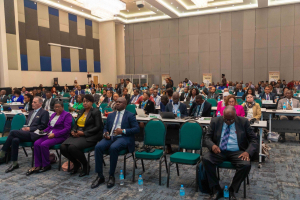
“Free movement of people a fundamental human right” – Khartoum Center Director
In his remarks, Mr Maemo Machete, Director of the AU’s Khartoum Center focused on improving migration governance, said youth were an integral part of the migration conversation, adding that the continent’s vision of free movement cannot be fully actualized without taking cognizance of the role of young people. He thus described the inclusion of youth in the migration agenda as crucial for the realization of the vision of Agenda 2063 on integration and free movement of persons.
Mr Machete noted that it was only by implementing the provisions of the FMP and MPFA that the goals of the AfCFTA will be seamlessly realized, noting that such a move would allow all economies across the continent to significantly benefit from the resultant improved intra-African trade, through seamless mobility of goods, services, ideas and cultures across the continent.
“As we explore the nexus between migration and trade, we should appreciate that Africans have diverse cultures and traditions. We should also consider how leveraging intra-African mobility can unlock the immense potential of our people and our economies for social and economic transformation and development. When people move freely, ideas and cultures move with them,” he noted.
Mr Machete said the exchange of goods, services and ideas will bring about greater prosperity and inclusive development. He therefore underscored the necessity for all stakeholders to work collectively to break down physical barriers to Africa’s integration, including developing seamless transport and communication infrastructure and creating simplified visa procedures for enhanced mobility for all.
“The movement of people across borders in Africa is not only a fundamental human right but can be a powerful tool for advancing the connectivity of economies. It also has the potential to boost household incomes, reduce household poverty, inequality and stimulate economic growth. It is [also] imperative to promote mutual recognition of skills and qualifications across the continent. By doing so, we can create a conducive environment for labor migration, for the benefit of the continent,” Mr Machete said.
“Regular migration will reduce unsafe, irregular migration” – IOM Director
In her remarks, Ms Mariama Cisse, Director of the IOM Special Liaison Office to the African Union, said intra-African migration should be viewed from a broader perspective of enhancing intra-African trade, unity, peace, security and sustainable development. She therefore commended the AU and the AfCFTA Secretariat for implementing the AfCFTA Agreement, to eliminate trade barriers and improve intra-African trade.
Ms Cisse emphasized that the vision of the AfCFTA can only be guaranteed through trade liberalization and free human mobility around the continent, which would only be achieved through the implementation of the FMP. She pointed out the need to address the concerns of Member States in relation to national security and job losses, which, she said, will be tackled by the FMP’s full operationalization.
“Creating more opportunities for regular migration will make migration easier and reduce unsafe and irregular migration. Enhancing regular migration is a key priority to us at the IOM; we are engaging with Member States and key stakeholders to harness the benefits of migration and tackle the irregular movement of people and goods. Fostering result-based and mutually beneficial partnership is necessary to deliver on the goals of regular migration,” Ms Cisse assured.
She therefore called for a multi-stakeholder and result-oriented strategy for the actualization of the vision of free movement in Africa, along with the support of Member States, assuring the IOM’s continued support for Africa’s free movement agenda. “Given the socioeconomic and development prospects of migration, women and youth have to be put at the center of the policy and decision-making processes as they are most impacted by migration,” Ms Cisse also urged.
“Germany in support of AU’s free movement agenda” – German Envoy
In her remarks, Ms Margit Hellwig-Bötte, German Ambassador to Botswana, emphasized the immense economic benefits of free movement, which, she said, allows individuals to seek better employment opportunities, businesses to expand their operations, and investors to explore new markets. She described labor mobility as a means through which the interdependent themes of free trade and free movement can jointly contribute to Africa’s development and greater continental integration.
Ms Bötte commended the AU for relentlessly promoting the vision of an integrated continent through its promotion of the ratification and implementation of the AfCFTA and the FMP, underlining the Government of Germany’s commitment to accompany the AU Commission and other AU organs in their advisory, capacity building and resource mobilization efforts towards the ratification and implementation of the AU-FMP.
“Germany equally appreciates the collaborative efforts around the AU-ILO-IOM-ECA Joint Labor Migration Program. This important continental multi-stakeholder initiative does not only address the challenges but also aims to capitalize on the opportunities of labor migration for sustainable development. It recognizes that free movement and mobility of workers is crucial to advancing regional integration on the continent.”
To this end, Ms Bötte said PAFoM-8 offers a great opportunity to deepen discussions around the linkages between trade, free movement and labor migration. She also described the Forum as an opportunity to identify the complementary roles of government structures, Regional Economic Communities (RECs), trade unions, civil society and business organizations in achieving the vision of an integrated Africa.
“Our government – through its implementing organization GIZ – has contributed to strengthening the technical and operational capacities of labor institutions, social partners, and civil society to improve the governance and administration of labor migration. The support for the development of the guidelines on labor migration related provisions of the Free Movement Protocol is a clear sign of the importance attributed to the linkages between free movement and labor migration,” noted the German envoy.
“I testify our visa-free regime is working; there are no threats” – Rwanda’s Immigration Chief
While handing over the chairmanship of PAFoM to Botswana, Ms Lynder Nkuranga, Director General of Rwanda Directorate General of Immigration and Emigration (DGIE) cum PAFOM 7 chair, said Rwanda has embraced the principle of free movement as all African citizens no longer require a visa to visit the country.
“Rwanda has embraced the free movement of people and no visa is required of all African citizens. No visa is required for Commonwealth citizens and no visa is required for citizens of Francophone countries. I can testify that the visa-free regime is working, we have benefitted and there are no threats resulting from implementation of our free movement policy, as being perceived by some Member States,” Ms Nkuranga assured fellow AU Member States.
The outgoing PAFoM chair said her leadership of PAFoM-7 offered AU Member States an opportunity to develop a common position on climate-induced migration ahead of COP 27, held in November 2022, at Sharm El Sheikh, Egypt. Subsequently, she said the Republic of Rwanda, as PAFoM-7 Chair, was in collaboration with the AU Commission tracking the implementation of the Forum’s recommendations and a detailed action plan which Rwanda intends to continue to champion.
“As climate change presents a serious and long-term challenge to global development, there is a need for Member States to continue to take bold and concerted actions to address the impacts of climate change on human mobility and to adapt to the impacts of climate change in a sustainable way so as to deliver to us peace and prosperity and ensure that no one is left behind.
“On behalf of the Republic of Rwanda, I wish to hand over the PAFoM-7 chairmanship to the Republic of Botswana. I also wish to confirm our commitment to supporting the new PAFoM-8 chair and providing all the necessary support. I also wish to express my appreciation to the AUC and other partners for the collaboration and support that enabled us to make considerable progress in actualizing the PAfOM-7 recommendations,” she concluded.
PAfOM-8 call for improved regulatory environment for free movement
In a communique issued at the end of PAFoM-8, held from 31st October to 2nd November 2023, senior officials responsible for immigration and migration, international cooperation, trade and investment, labor and employment from AU Member States as well as parliamentarians from continental and regional institutions, committed to supporting the implementation of the clarion call and action points of PAFoM-8.
Among others, the PAFoM-8 communique called on Member States to improve the migration regulatory environment so as to facilitate free movement in its full scope, particularly the right of entry, right of residence, and right of establishment, as well as the need to align trade and migration strategies with the AfCFTA and reduce barriers of doing business on the continent to attract investors.
The communique called on the MS to leverage programs like JLMP to expand regular pathways for migrant workers to reduce trafficking in persons and migrant smuggling and called on the AU Commission to jointly with Member States strengthen border governance using the databases of Interpol’s National Central Bureaus (NCBs) and through effective border management systems to ensure safe, orderly, and dignified movement in accordance with the Global Compact for Migration (GCM).
Moreover, PAFoM-8 called on AUC, RECs, Member States, and National Coordination Mechanisms on migration (NCMs) to deepen engagements with stakeholders at national, regional and continental levels, on the one hand. And also, further deepen engagement with each Member State’s lawmakers and policymakers to advance advocacy for the ratification of the Protocol.
The Communique also called on the AU Commission to revive the AU Conference of Ministers responsible for Civil Registration and develop a comprehensive program to address gaps and challenges of civil registration and legal identity related matters on the Continent. It urged the AU Commission, RECs and international organizations to build the capacity of Member States to develop and strengthen civil registration and legal identity systems to allow for social inclusion.
Member States were further urged to align their civil registration and legal identity policies as well as offer mutual recognition systems, including streamlining trade and customs procedures, and harmonization of trade rules. They were advised to leverage technology and digital platforms in optimizing the benefits of migration and trade as well as reducing risks associated with it and further harness the gains of technology and Artificial Intelligence to augment activities and processes in intra-African trade.
PAFoM 8 fostered a renewed understanding of the nexus between free movement and free trade and unpacked the socio-economic benefits and positive multiplier effects of this connection. The Forum also provided crucial recommendations, which, if implemented, will give rise to concrete initiatives that harness the benefits of the nexus between trade and the free movement of people, especially labor migration.
The AfCFTA has revived the focus on creating an economically integrated Africa. Yet, improved intra-African trade will remain a mirage without free human mobility and a resolute push to remove barriers that impede free movement and migration. Therefore, to fully realize the potential of the AfCFTA, implementers of the landmark initiative must find synergy with the free movement of people. Indeed, trade does not happen in a vacuum, i.e., there is no free trade without free movement of people.

